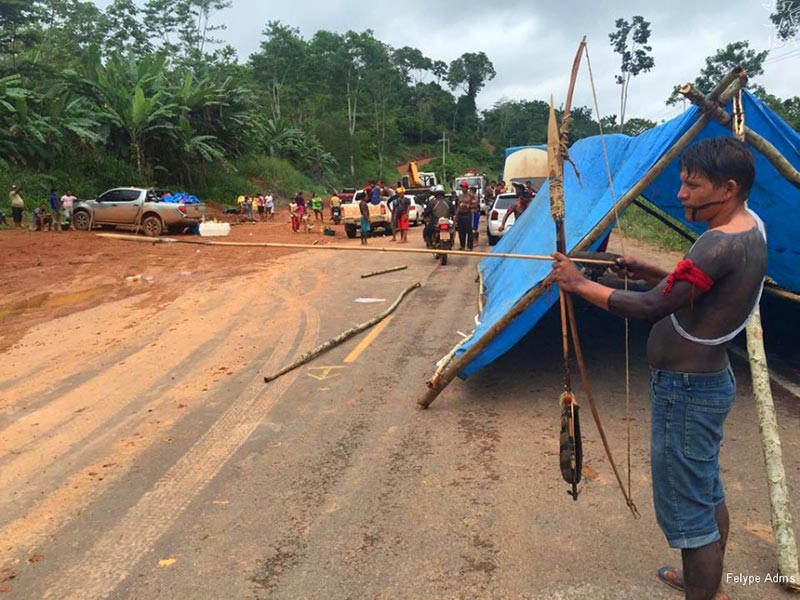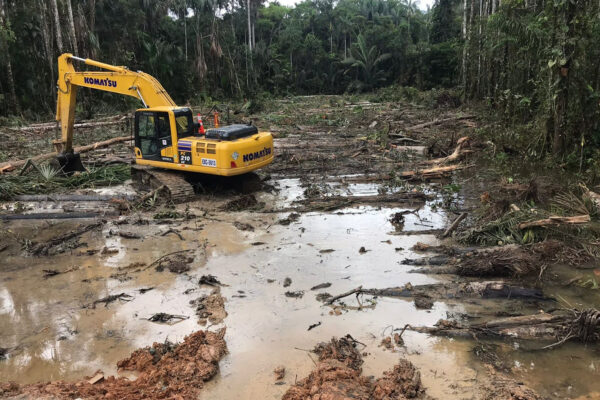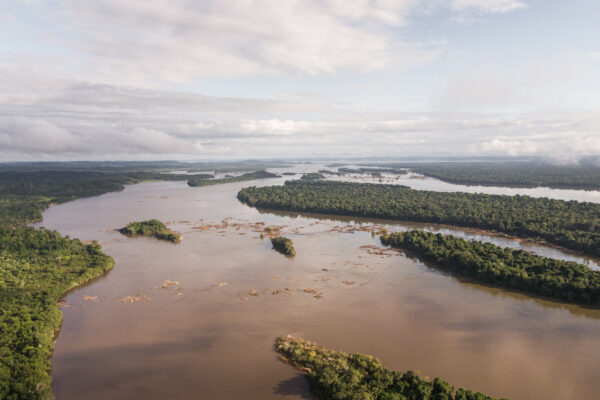
It’s carnival time in Brazil, but for people of the Xingu there is no time to celebrate. Three years after construction initiated on Belo Monte dam, with the project now nearing 70% completion, the Norte Energia consortium used the distraction of carnival to request an Operating License (LO). Upon approval, this would allow the consortium to permanently dam and redirect the Xingu River as well as ramp up the very first turbines.
At the same time, just prior to the license request, 100 leaders from eight indigenous ethnic groups blocked the entrance to the Belo Monte dam complex in retaliation. The affected indigenous peoples requested basic sanitation, schools, health centers, and protection of their territories, as well as compensation for the loss of ornamental fish, which they have historically relied upon for subsistence.
While Norte Energia‘s request for a license appears to be a routine procedure, it is in fact a crime against both Brazil’s judicial system and respect for the law. Legally in order to request a license, Norte Energia is required to comply with all conditions set up by Brazil’s environmental agency, IBAMA, but Norte Energia aims to move forward while dodging such legal formalities.
Among the most important pending legal requirements, Norte Energia has failed to implement a Plan of Territorial Surveillance and Monitoring, which is intended to minimize impacts and pressure on indigenous lands, while helping to secure territorial rights.
Norte Energia has already imposed cultural ethnocide upon many communities. While construction on the dam moves forward, none of the 34 promised health centers or school buildings were built in affected communities. Additionally, the company has already displaced many locals, and aims to displace and relocate 2,000 more families to Altamira “at any cost” by the end of March. Many families already expelled from their homes did not receive compensation, while others were paid a minimal amount and then required to sign blank papers.
“We were expelled like wild animals into the middle of the world. We are not animals we are people! We were born and raised here. We are the ‘children’ of this place,” said fisherman Otávio das Chagas, who was expelled from his island with a family of seven. “I don’t understand how this can happen. How can they trash us? I have no words to express my feelings. I am a man without a voice.” Das Chagas was compensated a mere US$4,200 for his land, yet today he must now pay exorbitant rent while starving with his family in the city of Altamira.
Fishermen with no fish, farmers with no land, indigenous peoples with no cultural protection, and urban dwellers with no houses – all of these citizens have been abandoned by their government, without legal support, and exposed to the demands of corporate Norte Energia and its multitude of lawyers. There is a feeling of desperation throughout the city.
Leader of Movimento Xingu Vivo and a tireless opponent of the dam, Antonia Melo, is one of many who will be displaced. Unlike those who live in ramshackle houses on top of a filthy wetland, Melo, similar to other displaced people, owns a spacious house with a backyard filled with fruit trees and flowers. Melo is anxious, and has no idea where they will take her. She knows that the few houses built by Norte Energia are not only far from the city, but also small and sweltering, without a single tree nor a backyard. She does not want to leave her home.
According to Francisco Nobrega, a federal public defender who has provided legal counsel to people affected by Belo Monte since mid-January, this situation is completely irregular. By law, Norte Energia needs to “secure living conditions superior to those [currently] available to the affected population before the implementation of the project.” Nonetheless, as stated by Local State Prosecutor Thais Santi, “Belo Monte [dam exists in] a terrifying world where anything is possible [and] where law creates no limits.”
Belo Monte’s construction continues to be mired in serious delays that will eventually cost the consortium millions in fines.
While the most recent occupation against the dam construction dissolved two days ago, participants promise to return soon and in greater numbers until their demands are met. Meanwhile, these voices crying for justice and basic human rights are buried beneath carnival chants echoing through the streets of Brazil, washing away any memory of the despair, chaos and corruption in which the country lives.













